Text
2024-04-28// 今年、ようやく日本に戻れることを嬉しく思っている。日本に子会社がある母国の会社の面接に合格した。つまり、インターンシップの一環として日本で働き始める。
#日記#japanese langblr#japan#life in japan#日本#日本語#日本語の勉強#language learning#learning japanese#japanese studyblr#studyblr#study motivation
11 notes
·
View notes
Text
小説の語彙力(2)

名詞 // Nouns:
霧(きり)fog
しかめ面(しかめづら)frown
疎遠(そえん)estrangement
手がかり(てがかり)handhold; clue, lead
髭面(ひげづら)bearded face
閃き(ひらめき)insight, flash (e.g. of inspiration)
動詞 // Verbs:
買い被る(かいかぶる)overestimate
再現する(さいげん)reenact, recreate
下げる(さげる)clear (plates from a table)
接触する(せっしょく)come into contact, get in touch
撤回する(てっかい)withdraw, retract
呪う(のろう)curse
閃く(ひらめく)flash, sparkle
形容詞 // Adjectives:
空の(から)empty
肝心な(かんじん)essential, crucial
切実な(せつじつ)urgent, serious
厄介な(やっかい)bothersome
その他 // Other:
気が進まない(き が すすまない)reluctant to do sth.
霧がかかっている be foggy
言葉を切る(ことば を きる)stop talking
せいぜい at the most, to the utmost
羽目・破目になる(はめ)become stuck in an unpleasant situation
#小説の語彙力#語彙リスト#japanese langblr#language blog#language learning#learning japanese#studyblr#japanese studyblr#study japanese#japanese vocabulary#japan#japanese#japanese language#study notes#vocabulary#vocabulary list#日本語#日本語の勉強#nihongo#jlpt n1
31 notes
·
View notes
Text
小説の語彙力(1)

名詞 // Nouns:
基調(きちょう)basic tone, basic theme
後年(こうねん)in (one's) later years
権現(ごんげ)incarnation
酸味(さんみ)sourness, sour taste
駄洒落(だじゃれ)bad joke
店内装飾(てんないそうしょく)in-store decoration
末裔(まつえ)descendant
装い(よそおい)outfit
動詞 // Verbs:
あやす soothe, comfort, humor
利かせる(きかせる)season (e.g. with salt), bring out, use
渋る(しぶる)be reluctant, be unwilling, balk
なつく become emotionally attached
放る(ほうる)neglect, abandon, leave alone
形容詞 // Adjectives:
渋い(しぶい)bitter, sour, harsh, grim
その他 // Other:
後々(のちのち)later
機転が利く(きてん が きく)be quick-witted
散々(さんざん)severely, harshly
駄々をこねる(だだ)throw a tantrum
#小説の語彙力#語彙リスト#japanese langblr#langblr#language blog#learning japanese#language learning#study japanese#japanese vocabulary#japan#japanese#japanese language#study notes#japanese studyblr#vocabulary#vocabulary list#日本語#日本語の勉強#nihongo#jlpt n1
87 notes
·
View notes
Text
改まった形|Polite Forms
In formal settings like in a business meeting or at a public gathering some words are switched with politer forms. You often hear them when somebody is giving a speech, holding a presentation or on TV. But they appear in written form as well, especially in business context. Basically, everywhere where keigo is used, it is also expected to apply politer forms.
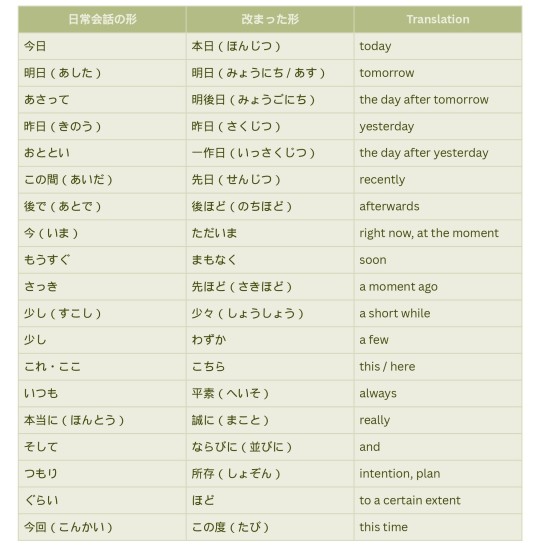
#文法#敬語#japanese langblr#langblr#studyblr#study movitation#learning japanese#japanese vocabulary#japan#japanese#study blog#study notes#language blog#keigo#japanese studyblr#japanese grammar#japanese language#日本語#日本語の勉強#nihongo
164 notes
·
View notes
Text


2024-02-28// ようやく黒ずんだシルバーアクセサリーを磨いた。面白いことに、アクセサリーのお店で働いているといっても、自分ではあまりアクセサリーは持っていない。同僚は本当にいい人ばかりだから、バイトを辞めるときはちょっと寂しいかもしれない。
#日記#japanese langblr#studyblr#study aesthetic#study notes#light academia#pastel academia#japan#japanese#study blog#studyspo#study movitation#japanese studyspo#university#college#books#reading#studying#student#student life#lofi#lofi aesthetic#earrings#silver#jewelry#rose#necklace#日本語
53 notes
·
View notes
Text

This post is an addition to 敬語の5分類|The 5 Types of keigo.
尊敬語の特定形
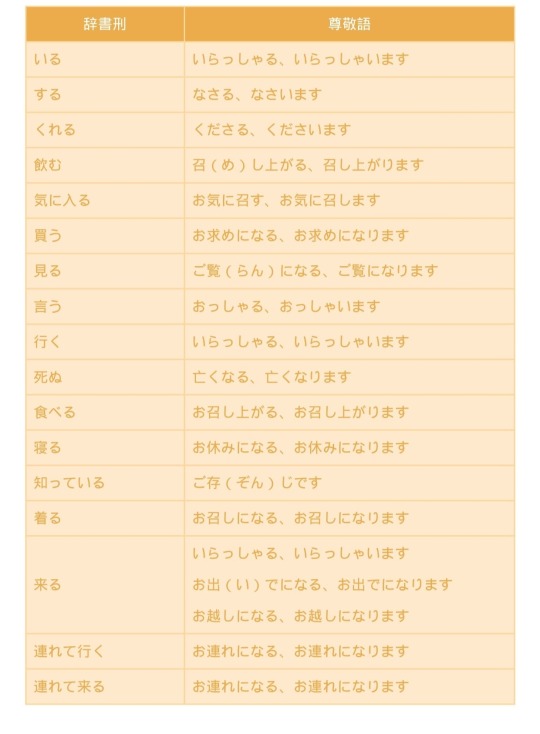
謙譲語Ⅰの特定形
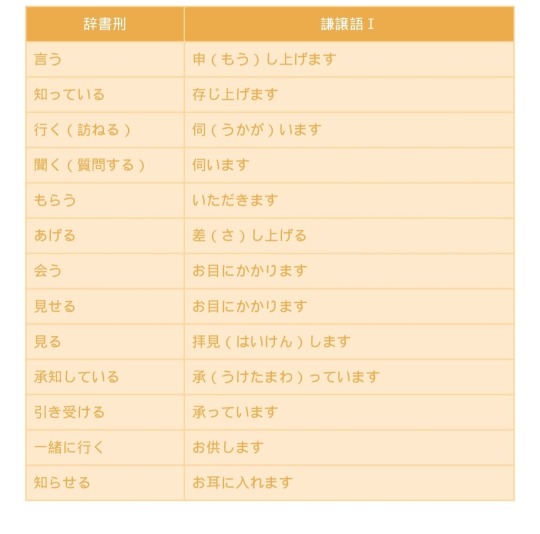
謙譲語Ⅱの特定形
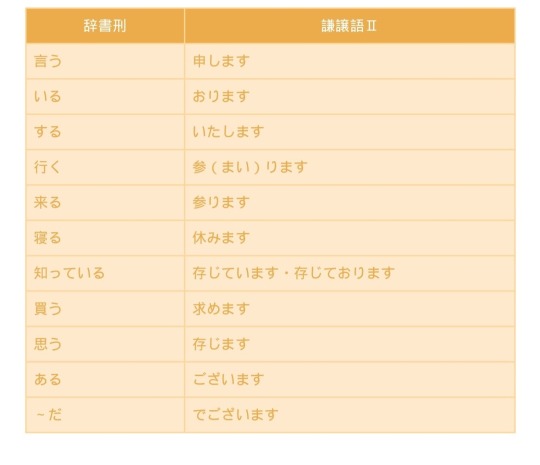
#文法#敬語#japanese langblr#learning japanese#japanese vocabulary#japanese#japanese language#keigo#study notes#japanese studyblr#japanese studyspo#japanese grammar#nihongo#日本語#日本語の勉強
90 notes
·
View notes
Text
敬語の5分類|The 5 Types of keigo
In the Japanese language it is possible to show respect towards another person by replacing words, mostly verbs, with politer equivalents. This can be done by using elevating expressions for the actions of your superior or degrading expressions for your own actions.
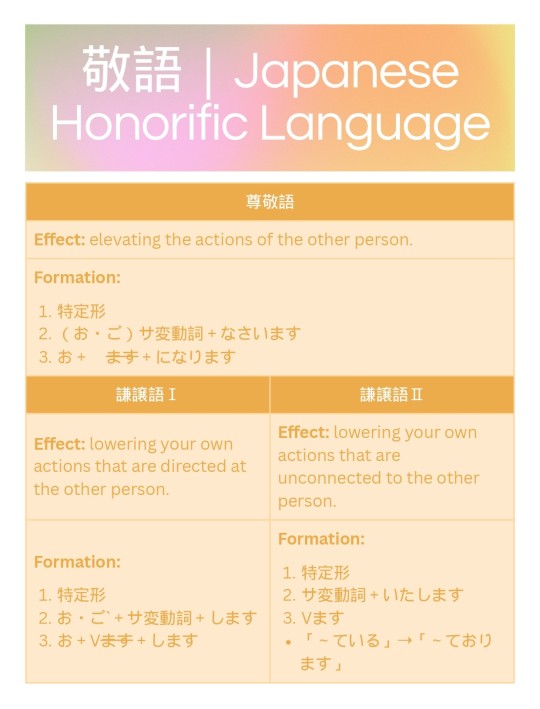
Overview: Verb Formation Rules for sonkeigo 尊敬語, kenjōgo I 謙譲語Ⅰ and kenjōgo II 謙譲語Ⅱ (also known as teichōgo 丁重語).
In a guideline released by the Japanese Agency for Cultural Affairs in the year 2007 keigo has been divided into five types: 尊敬語・謙譲語Ⅰ・謙譲語Ⅱ(丁重語)・丁寧語・美化語. The first three types demonstrate the most complex rules, hence why I summarized them in the chart above for a quick overview. Hereafter, you can find thorough introductions to each type.
尊敬語|Respectful Language
Sonkeigo is the most basic method to pay special respect towards a teacher, a superior or a client. This can be done by switching the verb (refering to the action of your superior) with its passive form.
e.g. 読みます → 読まれます
However, the degree of politeness isn't that high. Hence, it is important to learn the following formation rules as well:
1)特定形 |Special forms
Some verbs have a fixed forms. If a verb has a special form it is to be used.¹
e.g. いる・行く・来る → いらっしゃいます
2)サ変動詞+なさいます
In this context サ変動詞 refers to nominal verbs. Basically, nouns that can be turned into verbs by adding する. It is possible to add お or ご infront of the verb but it can be also omitted if unsure which prefix is the right one.
e.g. 出発する → (ご)出発なさいます
3)お+Ⅴます+になります
This formation rule is for all verbs that do not belong into either of the two categories above. Omitting ます leaves the so-called renyōkei 連用形 or conjunctive form of the verb. Here, the prefix added is always お.
e.g. 待ちます → お待ちになります
It is not uncommon to apply this formation rule to サ変動詞 as well. Depending on the nominal verb お needs to be changed to ご.
e.g. 参加する → ご参加になります
However, there are exceptions. Some nominal verbs are not idiomatic and end up sounding unnatural to native ears.
e.g. 運転する → ご運転になります ✕
運転する → 運転なさいます 〇
謙譲語 Ⅰ|Humble Language I
Kenjōgo I + II have the opposite effect of sonkeigo. They degrade one's status and are therefore applied only to your own actions or the actions of someone from your inner circle (e.g. a co-worker, or a family member).
In contrast to kenjōgo II, kenjōgo I is used when your action (or the action of someone from your circle) is directed at the person you want to pay respect to. It is also used when you do something for said person.
The formation rules are as listed below:
1)特定形 |Special forms
Some verbs have a fixed forms. If a verb has a special form it is to be used.¹
e.g. 言う → 申し上げます
The translation would be "saying sth. to sb." or "telling sb. sth." implying that your action is directed at the person you want to pay respect to.
2)お・ご+サ変動詞+します
Again, there are some verbs that sound unnatural when this formation is applied.
e.g. ご運転します ✕
In this case, you can formulate the sentence with ~させていただきます or switch to kenjōgo II.
e.g. 運転させていただきます 〇
運転いたします 〇
Note that, depending on the situation ~させていただきます might give of the impression that you are putting yourself down too much. This can result in making your counterpart feel uncomfortable.
3)お+Ⅴます+します
This formation rule is for all verbs that do not belong into either of the two categories above. Omitting ます leaves the so-called renyōkei 連用形 or conjunctive form of the verb. Here, the prefix added is always お.
e.g. 伝える → お伝えします
謙譲語 Ⅱ|Humble Language II
Kenjōgo II is used when your own action is unconnected to the person you want to pay respect to. Therefore, this type of language can often be found in anouncements, news reports or broadcasts elevating its audience. At train stations one often repeated phrase is:
e.g. もうすぐ電車が来る → まもなく電車が参ります
In the example above you can see that not only the verb has been switched with a politer equivalent, but the adverb as well. There are many words that can be switched with politer versions. Unlike verbs, they do not need to be inflected and can be studied like regular vocabulary.
It can also be pointed out that the action does not have to be conducted by the speaker, but can be an object (like in the example above) or a third party as well.
The formation rules are:
1)特定形
Some verbs have a fixed forms. If a verb has a special form it is to be used.¹
e.g. 言う → 申します (as in 私は◯◯と申します)
When introducing yourself you simly "say" or "state" your name. This is not considered an action that is directed at the person you want to pay respect to, hence it falls into the category of kenjōgo II.
2)サ変動詞+いたします
e.g. 応募する → 応募いたします
3)丁寧語
For all verbs that do not fall under the categories above, teineigo is used, or in other words the です・ます form.
e.g. 話す → 話します
In case the ~ている form is used, the degree of politeness can be elevated by replacing it with ~ております which is the special form of いる.
丁寧語|Polite Language
Teineigo is the neutral polite language. You're probably already familiar with this one, since this is the most foolproof way of speaking politely due to its absence of any kind of seesaw principle. It is used everywhere outside of your circle of friends and the safest way to talk to strangers. However, in certain situations it is expected to raise the level of politeness.
e.g. 聞く → 聞きます
美化語|Refined Language
There is a certain number of words, especially nouns, that can be turned into more elegant sounding versions. It can be easily understood by just looking at some examples.
e.g. 金 → お金
酒 → お酒
料理 → ご料理
米 → お米
散歩 → お散歩
Adding the respective prefix お or ご takes away the roughness of a word. This, however, can only be done with a few selected words. Refined words are commonly used in both formal and informal speech.
‾‾‾‾‾‾‾‾‾‾‾‾‾‾‾‾‾‾‾‾‾‾‾‾‾‾‾‾‾‾‾‾‾‾‾‾‾‾‾‾‾‾‾‾‾‾
¹ I compiled all special forms 特定形 that you need to know in this post: 敬語の特定形|Keigo: Special Verb Forms.
#文法#敬語#japanese langblr#langblr#studyblr#study movitation#learning japanese#japanese vocabulary#study aesthetic#light academia#japan#japanese#study blog#study notes#language blog#language#lingusitics#keigo#study motivation#studyspo#japanese studyblr#japanese grammar#japanese language#japanese studyspo#日本語#日本語の勉強#nihongo#learn japanese
196 notes
·
View notes
Text


2024-02-13// 半月ほど前から敬語に関する投稿に取り組んでいます。綺麗なグラフィックを作成できたところまで、様々なフォーマットの問題を抱えていました。近いうちに皆さんにお見せできると思います!
For about half a month I have been working on a post about keigo 敬語, which is the infamous Japanese honorific language. I have encountered many formatting problems until I was able to create a clean graphic. Hopefully I can upload it soon!
#日記#japanese langblr#langblr#studyblr#study motivation#learning japanese#japanese vocabulary#study aesthetic#light academia#japan#japanese#study blog#language blog#studyspo#jlpt n1#language#japanese studyblr#japanese studyspo#日本語#日本語の勉強#coffee#pac man#video games#dark academia
48 notes
·
View notes
Text
文学作品から学ぶ語彙
名詞 // Nouns:
貸出日(かしだしび)date of lending
借り主(かりぬし)borrower, debtor
語気(ごき)tone, manner of speaking
テレパス telepathy
瞳孔(どうこう)pupil (of the eye)
日付(ひづけ)date
返却日(へんきゃくび)date of return
動詞 // Verbs:
読破する(どくは)read through, finish reading
発露する(はつろ)manifest, display, express
秘密を漏らす(ひみつ を もらす)let out a secret
ふんぞり返る(ふんぞりかえる)lean back with outstrechted legs; get cocky, be arrogant
指でなぞる trace with one's finger
形容詞 // Adjectives:
奇妙な(きみょう)strange, peculiar
その他 // Other:
相当に(そうとう)correspondingly
~が骨だ。(ほね)...is hard work.
ろくに~ない barely (N1 grammar)
#文学#語彙リスト#japanese langblr#langblr#studyblr#study motivation#learning japanese#study japanese#japanese vocabulary#study aesthetic#light academia#japan#japanese#study blog#studyspo#literature#study notes#japanese literature#jlpt n1#language#japanese studyblr#japanese studyspo#japanese studies#日本語
35 notes
·
View notes
Text
読解と単語 // Reading Comprehension and Vocabulary

「わあ、綺麗な本⋯⋯」
千反田の嘆息に、つい視線がそちらを向いてしまう。なるほどそれは、お嬢様の歓心を買うだけのことはある見事な装丁だった。表紙は革張りで、細密な飾り模様が施された。
― 米澤穂信 (2017): 氷菓, p.55.
‾‾‾‾‾‾‾‾‾‾‾‾‾‾‾‾‾‾‾‾‾‾‾‾‾‾‾‾‾‾‾‾‾‾‾‾‾‾‾‾‾‾‾‾‾‾
Vocabulary:
千反田える(ちたんだ)character name in the book (and later anime adaption) Hyōka by Yonezawa Honobu
嘆息(たんそく)gasp, sigh
つい unintentionally
お嬢様(おじょうさま)young lady (of pampered upbringing)
歓心を買う(かんしん)win favor
~だけのことがある as expected (N2 grammar)
装丁(そうてい)binding (of a book)
表紙(ひょうし)(book/magazine) cover
革張り(かわばり)leather-covered
細密な(さいみつ)finely detailed
施す(ほどこす)equip, add
‾‾‾‾‾‾‾‾‾‾‾‾‾‾‾‾‾‾‾‾‾‾‾‾‾‾‾‾‾‾‾‾‾‾‾‾‾‾‾‾‾‾‾‾‾‾
Translation:
"Wow, what a beautiful book!"
Hearing Chitandas gasp, I couldn't help but turn my gaze into her direction. Indeed, it was a splendid binding that, as expected, won over the favor of our little lady. The cover was of leather and had a finely-detailed decorative pattern applied.
― Yonezawa, Honobu (2017): Hyōka, p.55.
#文学#語彙リスト#japanese langblr#langblr#studyblr#study motivation#learning japanese#study japanese#japanese vocabulary#study aesthetic#light academia#japan#japanese#study blog#studyspo#literature#japanese literature#jlpt n1#language#japanese studyblr#japanese studyspo#japanese studies#日本語#日本語の勉強
53 notes
·
View notes
Text
文学作品から学ぶ語彙
名詞 // Nouns:
権威(けんい)authority
清楚(せいそ)neatness
苦笑い(にがわらい)bitter smile
微笑(びしょう)smile
名誉(めいよ)honor
動詞 // Verbs:
朽ちる(くちる)decay
さらす expose
しらばっくれる play dumb
ずば抜ける(ずばぬける)stand out
はぐらかす dodge (a question), evade
微笑む(ほほえむ)smile
形容詞 // Adjectives:
後ろめたい(うしろめたい)have a guilty conscience
薄気味悪い(うすきみわるい)eerie
おんぼろの shabby, run-down, worn-out
気だるい(けだるい)listless
微妙な(びみょう)subtle, delicate, fine
素っ頓狂な(すっとんきょう)wild, hysteric
その他 // Other:
概して(がいして)generally
どうとでも one way or the other, either way
なぜか for some reason, without knowing why
なにやら some kind of
#文学#japanese langblr#langblr#studyblr#study motivation#learning japanese#study japanese#japanese vocabulary#study aesthetic#light academia#japan#japanese#literature#japanese literature#jlpt n1#language#study blog#japanese studyblr#japanese studyspo#japanese studies#語彙リスト#日本語#日本語の勉強
87 notes
·
View notes
Text
2023-12-31 // 私は未だ新年の抱負を立てる習慣に参加したことがない。だが、今年は違う。2023年を振り返ると、大学を卒業したり、日本語能力試験N2を受けたりした。このようにして、来年は自分の人生を大きく変えたいと思っている。その前に、私の生活に多大な影響を与えている悪い癖を直したい。あなたも新年の抱負はありますか?

#日記#japanese langblr#studyblr#japanese studyblr#study motivation#japanese vocabulary#study movitation#studyspo#nihongo#日本語#日本語の勉強#japanese text#japanese diary
8 notes
·
View notes
Text
得るところがない。
There's nothing to gain.
#表現#japanese langblr#langblr#japanese vocabulary#studyblr#study motivation#learning japanese#study japanese#light academia#japan#japanese#日本語#日本語の勉強
4 notes
·
View notes
Text
文学作品から学ぶ語彙
名詞 // Nouns:
上目遣い(うわめづかい)looking at someone from below with upturned eyes
拳(こぶし)fist
棒読み(ぼうよみ)reading a text in a monotone voice
浪費(ろうひ)waste, extravagance
動詞 // Verbs:
当てになる(あてになる)be reliable
劣る(おとる)be inferior
遮る(さえぎる)obstruct, interrupt
承知する(しょうち)consent; know of
ちらと見る glance
退く(どく)step aside, move out of the way
緩む(ゆるむ)become loose
形容詞 // Adjectives:
恣意的な(しいてき)arbitrary
甚だしい(はなはだしい)excessive, tremendous
喧しい(やかましい)noisy, loud
その他 // Other:
それなり in its own way
百も承知だ being well aware
不幸に見舞われる(ふこう に みまわれる)be hit by misfortune
#文学#japanese langblr#langblr#studyblr#study motivation#learning japanese#study japanese#japanese studyblr#japanese studyspo#japanese vocabulary#vocabulary list#japan#japanese#japanese language#日本語#日本語の勉強#study blog#study notes#studyspo#nihongo#japanese literature
67 notes
·
View notes
Text
身の回りにある金属
銀(ぎん)silver (Ag)

アルミニウム aluminum (Al)

金(きん)gold (Au)

銅(どう)copper (Cu)

鉄(てつ)iron (Fe)

水銀(すいぎん)mercury (Hg)

ニッケル nickel (Ni)

鉛(なまり)lead (Pb)

プラチナ・白金(はっきん)platinum (Pt)

錫(すず)tin (Sn)

チタン titanium (Ti)

#語彙リスト#japanese langblr#langblr#studyblr#study motivation#learning japanese#study japanese#japanese studyblr#japanese studyspo#japanese vocabulary#vocabulary list#japan#japanese#japanese language#日本語#日本語の勉強#jlpt n2#jlpt n1#study blog#studyspo#study aesthetic#metal
182 notes
·
View notes
Text
文学作品から学ぶ語彙
名詞 // Nouns:
応酬(おうしゅう)reciprocation
咳払い(せきばらい)cough, clearing one's throat
沈黙(ちんもく)being silent
風貌(ふうぼう)looks, appearance
眼差し(まなざし)look, gaze
申し子(もうしご)child that was prayed for
動詞 // Verbs:
圧倒する(あっとう)overwhelm
後ずさる(あとずさる)back off
悟る(さとる)understand, comprehend
忍び込む(しのびこむ)steal in
たじろぐ wince, flinch, recoil
身を乗り出す(み を のりだす)lean forward
形容詞 // Adjectives:
異様な(いよう)bizzare
勤勉な(きんべん)diligent
ちょっとした slight, minor, trivial
間抜けな(まぬけ)stupid, idiotic
無秩序な(むちつじょ)chaotic
その他 // Other:
そうともさ! Exactly right!
その分(ぶん)to that extent
足らず(たらず)a little less than, just under
#文学#japanese langblr#langblr#studyblr#study motivation#learning japanese#study japanese#japanese vocabulary#study aesthetic#light academia#japan#japanese#literature#japanese literature#日本語の#jlpt n1
117 notes
·
View notes
Text
厭世(えんせい)
世の中をいやなもの、人生を価値のないものと思うこと。(引用:デジタル大辞泉)

出典: 創媒體 BeamMedia. (2018/05/03-07). "厭世詞選: 【 沒人要 】 人家是天菜曬恩愛我只能是廚餘" Selection of World-Weary Words: Not wanted by anyone. I am nothing but kitchen waste. http://misanthropy-gauge.beammedia.co/, (参照 2023-12-11).
厭世(えんせい)weariness with life, pessimism
世の中(よのなか)society, the world
〜ものと思う believe that...
Translation: The belief that the world is detestable and life worthless.
‾‾‾‾‾‾‾‾‾‾‾‾‾‾‾‾‾‾‾‾‾‾‾‾‾‾‾‾‾‾‾‾‾‾‾‾‾‾‾‾‾‾‾‾‾‾
Looking up today's word, I came a across a Taiwanese survey on misanthropic language under which an online exhibition titled Selection of World-Weary Words has been curated. The illustrations (see for example the one embedded in this post) seem to be more of a complementary function. Clicking on one of the 17 pictures on the user interface reveals a statement that stems from a very pessimistic outlook of a real person, yet it can be seen as a critical review on modern life.
Normally, I would refrain from sharing content that might promote negative thinking since the statements of the exhibition are quite explicit. At the same time I think these unpolished thoughts are a testimony to grave societal problems that otherwise would get ignored. So, if you're interested you can check out the exhibition using the link underneath the illustration.
Note that the text on the website is in Chinese. However, there are only a few short sentences and translation services like DeepL should provide sufficient support.
#定義#japanese langblr#japanese language#langblr#language#language learning#lingusitics#japanese#japan#jlpt n2#jlpt n1#japanese vocabulary#studyblr#study blog#studyspo#study motivation#study aesthetic#learning japanese#日本語#日本語の勉強#art exhibition#art#digital art#academic#light academia#dark academia#misanthropy#dark#modern art
11 notes
·
View notes